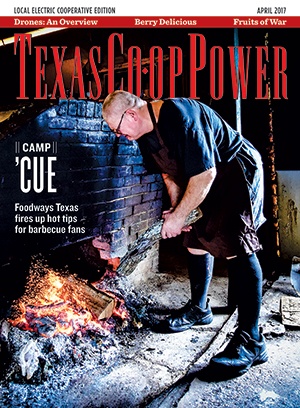Spring is the favorite season of many Texans—but when April showers turn into storms, they can be accompanied by dangerous conditions. Lightning kills an average of 93 Americans and injures 300 more every year, and flash floods result in 140 fatalities, according to the National Weather Service.
Thunderstorms are most likely to happen in the spring and summer months during afternoon and evening hours—but they can occur year-round and at all hours. Flash flood waves move at incredible speeds and can tear out trees and destroy buildings; walls of water can reach 20 feet or much more. Flash flooding deaths often occur at night and when victims are caught in cars.
Below are some safety tips to follow—regardless of the type of weather emergency—during this beautiful but sometimes stormy time of year.
Power Outage Tips
Before you call your co-op to report an outage, make sure you haven’t blown a fuse or tripped a breaker. Look outside to see if your neighbors’ lights are off.
When you call, tell your co-op if you heard any unusual sounds or can see any downed wires in the neighborhood.
Keep emergency numbers handy. Add your electric co-op’s number to the list. Keep a copy of the list in every vehicle, too.
Always consider downed power lines to be deadly. Don’t go near them and don’t let anyone else near them. Report the situation to your electric co-op immediately.
Keep plenty of flashlights in your house, preferably one on each floor. Make sure the batteries are fresh and easy to access. Keep a light in each vehicle, too.
Have a battery-powered radio in your home, and keep fresh batteries at the ready.
Have one or more power banks charged and accessible so that you can keep a cellphone charged during an outage. A working cellphone can keep you connected and informed when everything else goes dark.
Monitor updates about widespread power outages via radio broadcasts, or text or social media updates on your cellphone.
Keep the refrigerator door closed, and open it only when absolutely necessary. Food will keep for several hours in a closed, unpowered refrigerator and up to two days in the freezer if the door stays shut.
If you use a generator during a power outage, remember that improper hookup can create serious problems in safety and service. The proper transfer switch is extremely important. Please contact your electric co-op well before an emergency for information on installing and using standby generators.
Lightning Safety Tips
If you are caught outside, do not stand under tall objects. Go to a low place, such as a ravine or ditch. If you are in a group in the open, stay several yards apart from each other.
Avoid water and metal, including tractors and other metal equipment or vehicles.
If you are caught on a level field far from shelter and you feel your hair stand on end, lightning may be about to strike you. Drop to your knees and bend forward, putting your hands on your knees. Do not lie flat on the ground.
Flooding Safety Tips
If time permits after a flood warning is issued, take essential items to safe ground. Move to high ground immediately, before the escape route is cut off.
Do not drive through flooded areas. A car can easily be carried away by just 2 feet of water, and nearly half of all flood fatalities occur in vehicles. If your vehicle stalls in a flooded area, abandon it and seek higher ground.
If your home is flooded, keep the power turned off until the water has been removed and the electrical system inspected.


